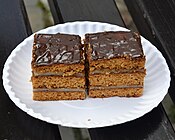In Polish cuisine, miodownik (Polish: [mjɔˈdɔvɲik] ⓘ, from miód 'honey'; German: Honigkuchen [ˈhoːnɪçˌkuːxn̩] ⓘ) or stefanka is a type of layer cake flavoured with honey, similar to cakes in other Slavic cuisines such as the Russian medovik and Czech medovnik. It is broadly considered a type of piernik, meaning a sweet and/or spiced confectionery good. The recipe for miodownik originates from Galicia (Southeastern Poland) and Central Poland.[1]
 Miodownik served in Poznań | |
| Alternative names | Stefanka, chonek łejkech |
|---|---|
| Type | Cake |
| Course | Dessert |
| Place of origin | Galicia (Southeastern Poland) and Central Poland |
| Serving temperature | Cold |
| Main ingredients | Honey |
The cake is prepared similarly to sponge cake, which is topped with honey that is melted and then cooled down along with other sugary ingredients. Once the mass of prepared dough is poured onto a baking sheet, it is baked at a temperature of 200°C for around 40 minutes.[2]

This recipe found its way into the cuisine of Polish Jews under the name chonek łejkech or chonek (from German honig — 'honey'), together with cuker łejkech (equivalent to biszkopt; a Polish variant of sponge cake) serving as a popular wedding cake.
See also
editReferences
edit- ^ "Potrawy regionalne - najsmakowitszy portal w sieci". potrawyregionalne.pl. Retrieved 26 August 2017.
- ^ Wirkowski, Eugeniusz (1988). Kuchnia żydów polskich. Interpress.